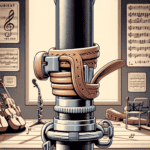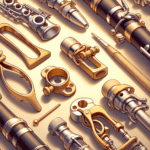As any clarinetist knows, the right ligature can significantly influence both your performance and overall sound. Among the many components that make up your instrument, the ligature, which holds the reed in place, plays a key role in sound production. However, not all ligatures are created equal, and the materials used in their construction can affect your experience and sound in different ways.
The Importance of Ligature Materials
The material of a ligature can impact several factors:
- Sound Quality: Different materials resonate and vibrate differently, which can influence the tonal qualities of your sound.
- Durability: Some materials hold up better over time and through frequent use, while others may require more frequent replacement.
- Adjustment and Flexibility: Certain ligatures offer greater ease of adjustment, allowing for more precise control over the amount of pressure applied to the reed.
Common Ligature Materials
When choosing a ligature, it's helpful to understand the various materials available, each with its own unique properties:
Ligature Material Comparison
Bright Sound
Warm Sound
Versatile Sound
1. Metal Ligatures
Metal ligatures are popular among many clarinetists for their durability and resistance to wear. Common types include:
- Brass: Known for its bright, projecting tone, brass ligatures are often plated in gold or silver to enhance aesthetics and performance.
- Stainless Steel: These ligatures provide a clean and clear sound, along with excellent durability. They don't corrode easily, making them a long-lasting option.
- Aluminum: Lightweight and easy to handle, aluminum ligatures can produce a warm sound. However, they may not be as durable as their brass or stainless counterparts.
2. Leather Ligatures
Leather ligatures are favored by some players for their aesthetic appeal and the warm, full sound they can provide.
- Leather offers a softer touch, which can contribute to a more intimate sound. However, they may not hold the reed as securely in place as metal ligatures and may require frequent adjustments.
- They typically provide a more traditional look and feel, appealing to players who value craftsmanship.
3. Synthetic Materials
In recent years, synthetic materials have become more common in ligature production:
- Plastic: Some ligatures made from high-quality plastics offer flexibility and lightweight performance. They can be less expensive and are often designed for easy adjustments.
- Composite materials: These ligatures combine various materials to optimize sound and performance. They often aim to offer the best qualities of both metal and synthetic ligatures.
Comparison of Ligature Materials
| Material | Sound Quality | Durability | Ease of Adjustment | Price Range |
|---|---|---|---|---|
| Metal (Brass/Stainless Steel/Aluminum) | Bright and clear | High | Moderate | $15 – $40 |
| Leather | Warm and full | Moderate | High | $20 – $60 |
| Synthetic | Variable – depends on design | Variable – generally high | High | $10 – $30 |
Choosing the Right Ligature for You
When selecting a ligature, consider factors like your playing style, the repertoire you typically perform, and your personal preference for sound. Here are some tips on choosing:
- Experimentation: Try out different ligature materials and styles. Depending on your playing context (e.g., ensemble playing vs. solo), your ideal choice might vary.
- Consult with Professionals: Speak to your teachers, colleagues, or local music shop experts for insights and recommendations based on your needs.
- Listen and Evaluate: Use sound recordings to help assess how different ligatures affect your sound. This can help you make a more informed choice.
Final Thoughts
Picking the right clarinet ligature is a significant decision that can shape your sound production and overall playing experience. By looking at the different materials available and seeing how they fit your needs, you can find a ligature that improves your playing. As you grow as a musician, feel free to try different options and take the time to see how each ligature works for you. Remember, the Martin Freres brand offers a variety of instruments and accessories known for their quality and craftsmanship, giving musicians great options to choose from.
Table of Contents
- The Importance of Ligature Materials
- Common Ligature Materials
- Metal Ligatures
- Leather Ligatures
- Synthetic Materials
- Comparison of Ligature Materials
- Choosing the Right Ligature for You
- Final Thoughts








